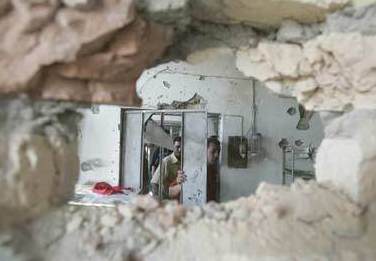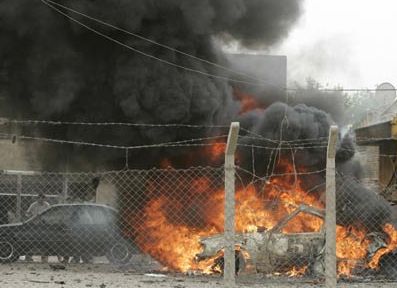Sadr offers truce to ease Iraqi crisis
(Xinhua)
Updated: 2008-03-31 13:52
Updated: 2008-03-31 13:52
BAGHDAD -- Powerful Shiite cleric Muqtada al-Sadr on Sunday asked his followers to put weapons aside after days of fierce clashes have pushed the nation to the brink of even larger bloodshed.
"In order to stop Iraqi blood being shed and maintain unity of Iraq, we call for an end to all armed appearances in Basra and all other Iraqi cities," Sadr said in a statement.
|
|
"We declare that anyone carrying weapon and target security forces, government institutions and political parties' offices, will not be one of us," Sadr said.
Sadr also urged people to cooperate with the security forces and the government to achieve security.
He asked the government to stop detaining his followers and implement an amnesty for detainees.
The government promptly welcomed his decision.
"The Iraqi government welcomes Sadr's decision to stop bloodletting and end armed appearances," government spokesman Alial-Dabbagh said on the state-run TV al-Iraqiya, adding that "this was an expected stance from Sadr."
"After this decision, anyone who carries weapon will not be from the Sadr movement and out of his instructions," he said.
|
|
He also said that Sadr's move "would largely promote peacemaking efforts which will bring back security to all the Iraqi cities."
Later, al-Iraqiya said a curfew which has been in place since Thursday will be lifted in Baghdad on Monday. But a traffic ban will remain in three Shiite districts controlled by the Sadrists.
The six-day clash between the Shiite gunmen and the Iraqi security troops have killed about 300 people and left more than500 wounded in Basra and Baghdad, according to the Interior Ministry.
Fierce battles have also seen in other major southern cities, where Sadr followers are locked in power struggles with rival Shiite groups.
The intra-Shiite struggle gave rise to concerns that Sadr could remove his eight-month ceasefire and plunge the nation into a renewed large-scale violence.
Sadr's Mahdi Army once fought a hard battle with the US troops, executed Sunnis at the height of Iraq's sectarian scuffle and was engaged in a turf war with Shiite rivals.
He ordered to stop all attacks last August after his militiamen were purportedly involved in a bloody confrontation with security troops in the holy city of Karbala.
The US military in Iraq praised his move, attributing it to one of the three reasons for security improvement.
However, the US and Iraqi troops kept going after what they termed as Special Groups, who allegedly separated from the Mahdi Army and were supported by Iran.
Iraqi Prime Minister Nuri al-Maliki personally took charge of the offensive on the Shiite gunmen in Basra.
He denied that the operation was directed at any specific political group, saying it was an security campaign with an aim to root out criminal activities and restore peace and law.
Sadr's followers, however, believed that the prime minister has political motivation.
Basra is Iraq's second largest city and rich with oil. Shiite rivals, including Sadr's bloc and the Supreme Iraqi Islamic Council (SIIC) led by Abdul Aziz al-Hakim, have been fighting for control the city as well as other regions in the south.
SIIC is the leading party in parliament and its military wing is a major component of Iraq's security forces.
Maliki has found his efforts suffered a setback. With six days of fight and the support of US and British troops, the fledgling Iraqi troops failed to take control of Basra.
A truce without victory will be an embarrassment for the ambitious prime minister, but a prolonged battle would be a more risky wager for him, as in that case, violence could spread and escalate, putting the hard-fought security gains in danger, and weakening the ability to deal with al-Qaida.
|
||
|
||
|
|
|
|

